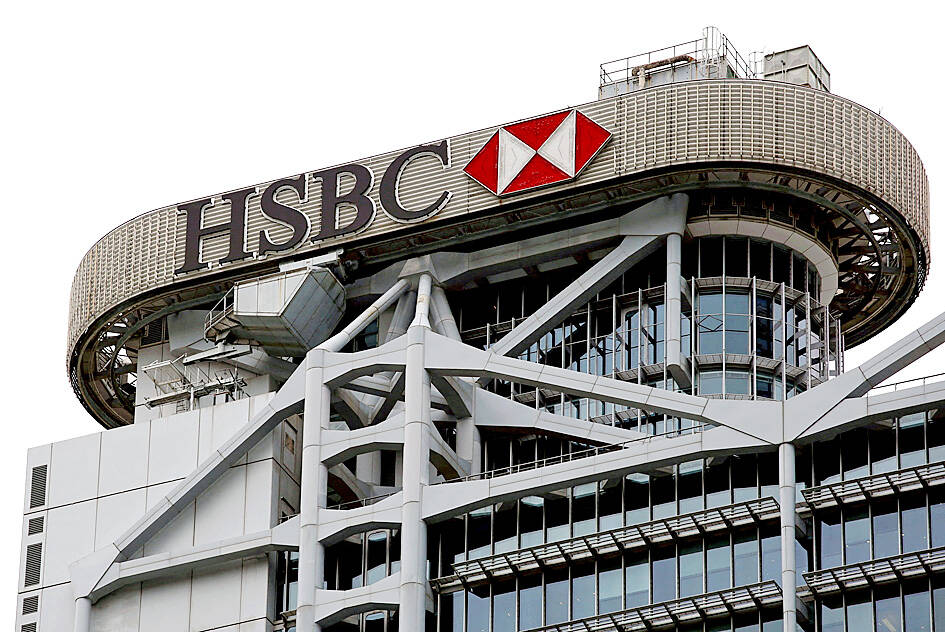HSBC Holdings PLC said it is targeting return on tangible equity for its Asia business that is in the “mid teens,” amid pressure from its top shareholder to improve returns.
Ping An Insurance Group Co (平安保險集團) has criticized the bank’s current model in Asia as being inefficient. It has taken specific aim at the lender’s returns for Asia, which it said stood at 10.5 percent last year, compared with 13.8 percent for its Asian peers on average.
The Chinese firm is also pushing for a separate listing of HSBC’s Asian arm.

Photo: Reuters
In a statement to the exchange, HSBC yesterday reiterated that the group’s ambition is for returns to be at least 12 percent from this year. It is targeting high-single-digit percentage wealth revenue growth, and mid-single-digit percentage lending growth over the medium to long term, the statement said.
HSBC also re-emphasized the importance of its international network.
“We now have an unrivaled international proposition that supports our Asia customers looking to trade with and grow in markets across Europe, the Middle East and the Americas, and vice versa,” chief executive officer Noel Quinn said.
About 60 percent of wholesale client business in Asia is cross-border, the lender said in a presentation.
The lender has been pivoting to Asia, selling operations in other parts of the world. It reiterated its commitment to invest about US$6 billion in Asia between 2021 and 2025.
The bank, which counts Hong Kong as its biggest market, has also been diversifying its presence in other markets in the region, amid rising geopolitical tension.
“In addition to our core strength in Hong Kong, we now have growth engines in mainland China, India, Singapore and beyond,” Quinn said.
Wealth is a key to its pivot to Asia, and the bank has been ramping up operations in the mainland and also aims to launch private banking in India in July.
The lender said it would be holding a week-long seminar for investors and analysts in Hong Kong and Singapore to discuss its ambitions.
Rival Standard Chartered PLC is also holding meetings with investors this week.

Vincent Wei led fellow Singaporean farmers around an empty Malaysian plot, laying out plans for a greenhouse and rows of leafy vegetables. What he pitched was not just space for crops, but a lifeline for growers struggling to make ends meet in a city-state with high prices and little vacant land. The future agriculture hub is part of a joint special economic zone launched last year by the two neighbors, expected to cost US$123 million and produce 10,000 tonnes of fresh produce annually. It is attracting Singaporean farmers with promises of cheaper land, labor and energy just over the border.

US actor Matthew McConaughey has filed recordings of his image and voice with US patent authorities to protect them from unauthorized usage by artificial intelligence (AI) platforms, a representative said earlier this week. Several video clips and audio recordings were registered by the commercial arm of the Just Keep Livin’ Foundation, a non-profit created by the Oscar-winning actor and his wife, Camila, according to the US Patent and Trademark Office database. Many artists are increasingly concerned about the uncontrolled use of their image via generative AI since the rollout of ChatGPT and other AI-powered tools. Several US states have adopted

A proposed billionaires’ tax in California has ignited a political uproar in Silicon Valley, with tech titans threatening to leave the state while California Governor Gavin Newsom of the Democratic Party maneuvers to defeat a levy that he fears would lead to an exodus of wealth. A technology mecca, California has more billionaires than any other US state — a few hundred, by some estimates. About half its personal income tax revenue, a financial backbone in the nearly US$350 billion budget, comes from the top 1 percent of earners. A large healthcare union is attempting to place a proposal before

KEEPING UP: The acquisition of a cleanroom in Taiwan would enable Micron to increase production in a market where demand continues to outpace supply, a Micron official said Micron Technology Inc has signed a letter of intent to buy a fabrication site in Taiwan from Powerchip Semiconductor Manufacturing Corp (力積電) for US$1.8 billion to expand its production of memory chips. Micron would take control of the P5 site in Miaoli County’s Tongluo Township (銅鑼) and plans to ramp up DRAM production in phases after the transaction closes in the second quarter, the company said in a statement on Saturday. The acquisition includes an existing 12 inch fab cleanroom of 27,871m2 and would further position Micron to address growing global demand for memory solutions, the company said. Micron expects the transaction to